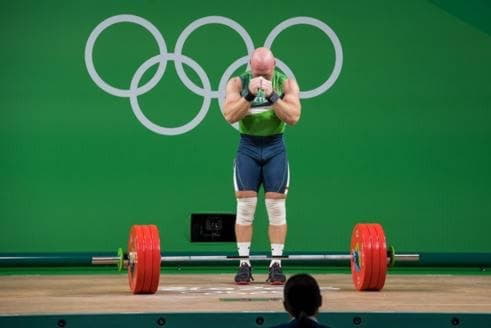
Inga Stasiulionyte
The Olympics of 2016 is over, leaving 306 happy gold medal winners that have reached their dream by climbing to the peak of the biggest human achievements. At the same time, there were over 10,000 athletes who went home empty handed. A whole 90 percent of Olympic athletes have suffered through a painful, dream-crushing loss - the same way that most people experience failures throughout their lives.
Inga Stasiulionyte, a former Olympian, now a brain training coach, a mentor and keynote speaker at MIT’s Global Entrepreneurship Bootcamp, says the difference between those who win and those who lose is not necessarily in their readiness to do the task, but mostly in their mind.
She, too, was prepared to do well in Beijing Games of 2008 in her javelin throw discipline. She trained daily for 15 years, was persistent and motivated. Even though Ms. Stasiulionyte easily threw the javelin over 60 m (197 feet) during her warm ups, her best throw arrived at only 55 m (180 feet) during the real competition. Her warm up mark would have easily made her a finalist in the Olympic Games.
“My biggest challenge was not physical or technical,” she says. “It was all in my mind. I just kept thinking that my competitors were much better prepared, and no matter how much I trained, they surely trained more. Only after the competition was over, I found out that some of these girls were competing while being seriously injured, throwing javelin with half-broken backs and torn ligaments. I realized how stuck I was in my mind. I lost the Games, but I won the biggest lesson of my life. ”

Inga Stasiulionyte, a former Olympian javelin thrower, currently a brain training specialist
Since then, Inga has become a brain training coach and a co-founder of Onbotraining, a mindset training online course. She shares her advice about why we lose, and how to eventually build a winning life.
1. Realize that we are the ones who stop ourselves from winning.
Every person in the world has amazing chances in succeeding in whatever they choose to do. There are countless examples throughout centuries of ordinary people accomplishing unthinkable things. The only difference between those who accomplish and those who don’t are our thoughts. To win in Olympics you need to have a strong mind, because your mind controls you. “What separates the gold medalists from the silver medalists is simply the mental game,” said Olympic gold medal-winning gymnast Shannon Miller. Therefore, the main fight that every Olympian has to undergo is with themselves.
2. There is very small chance to succeed in anything but it’s a good thing!
Both the Olympics and life are cruel - just very few win and many more get their dreams crushed. The competition is fierce, and only one percent of participants win gold medals at Olympics. Only 10% of the startups will succeed. There are only of 8% millionaires in the whole human population. However, the more challenging it is, the more we learn, and the more we improve our life quality as humanity. The key is to learn the right lessons from each failure!
3. There is limitless capacity in improving.
What chance is there for another record to be broken at Olympics? Why should you start yet another blog, write another book, open a new a bakery or business? Why does the world need another design of a bike or a dress? There are millions of very good ones already, however, we have every capability to do it better! The beauty of human brain is that it has limitless capacity in storing long-term memory and learning. So everything we know can be challenged and improved!For example, Usain Bolt broke the 100 and 200 meter records with the time that scientists said it is not humanly possible. Every year the records are broken, new cures are found, new discoveries are made. We just need to set our brains into the learning mode and let us perform.
4. Don’t give up easily.Most people get really upset and frustrated at a challenge and quit. We seem to have an ingrained belief that we have to be perfect, never fail and always succeed. I ask my clients to do tasks that would really challenge them to grow – such as train themselves to have no expectations from themselves nor others for three days, or to do difficult physical exercises to learn balance and strength. The goal is to figure out how we learn and what stops us from moving forward, and then fixing it.
5.The key to outsmarting the brain: letting go. Every time I give a new task, I tell people to repeat it at least 100 times without thinking, just going through the motion, without interruptions of the “protective brain.” Your brain thinks it’s protecting you from the pain of failure, but it works like an overprotective mother. We have to learn letting go. Learn to ignore the paralyzing thoughts, such as: “it’s too difficult,” “I cannot do it,” “I don’t want to fail,” “what will others think if I don’t succeed,” “maybe I am just not good at this...” Just let the thoughts pass by without focusing and fixating on them. Take deep breaths and exhale. Clear your mind from annoying thoughts and don’t stop till you complete the set task.
6. Learn to trust yourself. You have to learn to trust yourself and to trust the learning process. You, me, all of us are operating a very intricate and amazing capabilities bodies. Your thoughts are the biggest blocks preventing you from tapping into to your full potential. Just with our will we can get stronger, faster, wiser, more creative, more skilled… It is already all in you. You have to let yourself function in the full capacity!
7. Give yourself time. Don’t start with harmful judgments and unrealistic expectations of perfection from the first attempt. No one does anything perfectly from the first attempt. If you can do it from the first try, the challenge is too low for you anyway. According to Josh Kaufman, it takes around 20 hours to learn new skill. Give time for your body and brain to adapt to a new lesson.

Lithuanian Olympic team in Rio
8. Have faith, but not expectations. There is a huge difference in having a faith versus having expectations. Expectations limit our possibilities, they restrain us from seeing and accepting better options. Also, expectations are the reason why we start judging ourselves. Judging builds the wall in our mind which prohibits learning and improving. However, having faith means trusting in yourself and in life, whatever it brings - and this is what you have to develop and focus on in order to succeed.
9. Even if you failed at something you are not a failure. One action, behavior or result does not define you. According to Albert Ellis, we need to check our mindset against harming beliefs that lead us to self-deprecation. Failure means we did not put enough effort into learning and improving certain skill. However, we have all the capacity to learn that skill if we put the needed effort. When we fail, it is the perfect indication what we need to work more on. We take failure too personally. It is part of the process of improving and that’s it. We have to retrain ourselves to see it as a check point, but not as a final destination.
10. Success is not a given. You can reach it only if you keep learning from your failures. The main point is to do better than you have ever done, then to do it better than it has ever been done, so that you finally break new records, make new discoveries. That’s a way to make a real stamp in the world for you personally and for global progress. This is the real discovery journey and real freedom.
In conclusion, whatever you do, you should judge the outcome by how much you learned, and not by the completed task.
My dream is for more people to start enjoying their amazing capabilities. Take a free test to find out whether your mind is set for achieving success!
For more on mind training tips, info and exercises, subscribe to Inga’s Facebook page.
ABOUT INGA STASIULIONYTE
Inga Stasiulionyte is an Olympian athlete and javelin thrower, who was coached by the best coaches in Europe and the U.S. for over 20 years, and competed at the Beijing Olympic Games. Besides developing her career in sports, Inga simultaneously pursued a career in business, working with executives as a life coach. Inga’s dream is to provide access to everyone to the knowledge, tools and training that she received in sports that helped her win. She cooperated with a motivational writer to create Onbotraining, a motivational online coaching program that inspires people to reach their goals in life. Inga is a University of Southern California graduate with a BA degree in Entrepreneurship and minor degree in Communication Design. She also completed International Business and Global Affairs Master’s studies in the International University of Monaco. She is a mentor and keynote speaker at MIT’s Global Entrepreneurship Bootcamp.















